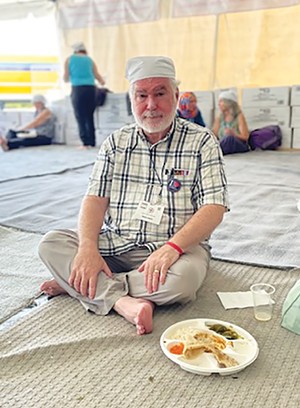
The 2023 Parliament of the World's Religions (POWR) convened at Chicago's McCormick Place Aug. 14-18. To reach the registration hall, I passed under banners invoking previous parliaments, including the original one hosted in Chicago in 1893, as part of the Columbian Exposition. The more modern incarnations started in 1993, also in Chicago. This year's theme was "A Civil Conscience: Defending Freedom and Human Rights." Next, one passes through the security gate – a reminder that even in an international gathering that celebrates harmony, safety is not dismissed.
Once inside, almost immediately I began to meet former classmates from seminary and colleagues. We posed for selfies, chatted about our respective ministries and relationships. I began to meet other registrants, who had traveled from overseas. As we waited in line, we added the POWR app to track the week's schedule and myriad workshops. Soon I was issued an ID badge and green canvas bag; I moved into an adjacent hall that featured a maze of booths peopled with vendors. On the first sweep, I tended to linger in front of each and glance at the display unless my eyes met those of the vendor. When that happened, an invitation was issued, and I found myself immediately engaged, chatting about meditation practices or perhaps the importance of social justice work.
I was grateful that I had attended a recent POWR pre-event in Springfield, a collaboration between the Liturgical Arts Festival and the Greater Springfield Interfaith Association. That event had highlighted the breadth of inspiration to be found in our community and had whetted my appetite for more of the same, on a larger stage.
Clean-shaven monks milled about clad in gray, brown or orange, passing Catholic and Protestant clerics dressed in black. Other clerics, especially women, wore a vast array of colors. Many wore clerical collars; some even wore stoles. An equal number did not overtly identify themselves as clergy – one universal feature is that everyone, regardless of tradition or status, carried a cellphone or tablet. It was exciting to find myself among so many thousands who had made their way to this Parliament, all seeking to connect and learn. I wandered about, collecting books, buttons, brochures. Small groups prayed, sang, meditated, walked together. Together, we formed a living tapestry of faith.
One point emphasized by the organizers is that the goal of such Parliaments is not unity but harmony. We do not gather the world's religions to convert, but to converse – to invite others into moments of appreciation, if not awe, and to catch a glimpse of the beauty embedded in other traditions.
In the main hall and workshops, speakers emphasized the need for a new global ethic. I listened to a multitude of renowned speakers, including Jane Goodall, describe the environmental problems that have escalated in our lifetime and must be robustly addressed by our societies. Other notable speakers included the Rev. William Barber, who co-leads the Poor People's Campaign.
Participants were invited to sign the new Global Ethic document. I did this and signed up for alerts from many other groups that raise awareness about such ills as violence against women and children. Some of the language I encountered reminded me of the Charter for Compassion that I had also signed years ago. Perhaps, I thought, the grounding of our spirituality is universal while the forms and language keep evolving to meet the demands of the age.
In other venues I watched liturgical dances that breathed life into ancient traditions. I walked a labyrinth while one woman played singing bowls. Elsewhere, I talked with authors and artists whose passion was to express the beauty and depths of their spiritual insights and longings. On several occasions, I removed shoes and donned a head covering as I joined throngs who were served a free vegetarian lunch briskly served by the Sikh community. During those lunches, I chatted with new friends while, in the background, various musicians performed – one day, for example, a Jewish folk ensemble.
Outside the main hall, Lake Michigan was bathed in the magnificent colors of mid-August. I walked outside to enjoy the spectacle of nature. Nearby, a few people preached their gospel to small clusters, but my attention was drawn to an extensive orange display. A sign noted that its purpose was to commemorate the 30,000 children who have been victims of gun violence since the massacre at Sandy Hook.
At one point during this Parliament, I remembered some lyrics from the 1971 song "Chicago/ We can change the world," by Graham Nash:
"Somehow people must be free
I hope the day comes soon
Won't you please come to Chicago? Show your face
From the bottom of the ocean
To the mountains of the moon
Won't you please come to Chicago? No one else can take your place"
The most compelling religious call for action is not for one time and place, but it's issued to every generation. The sentiment is that people of faith must respond. The invitation is to start wherever one happens to be, and to act in concert with others in good faith.
Rev. Martin Woulfe is minister of the Abraham Lincoln Unitarian Universalist Congregation in Springfield.

















